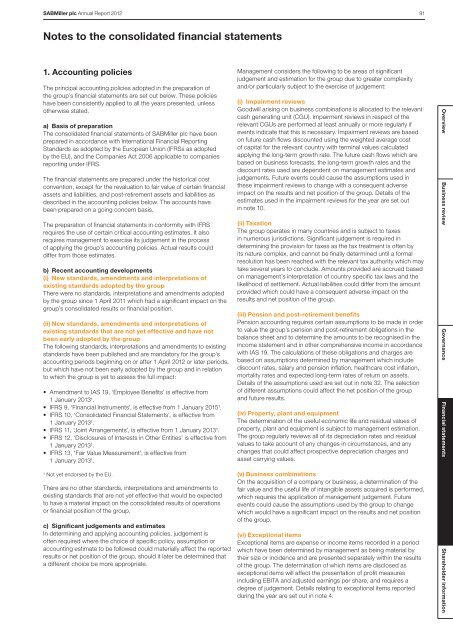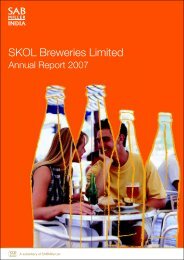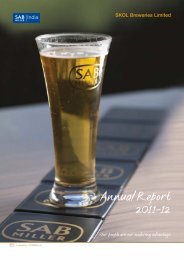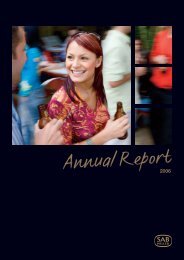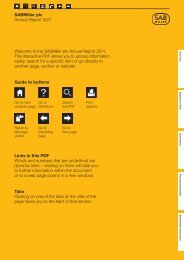Download Sabmiller Plc Annual Report 2012 PDF
Download Sabmiller Plc Annual Report 2012 PDF
Download Sabmiller Plc Annual Report 2012 PDF
Create successful ePaper yourself
Turn your PDF publications into a flip-book with our unique Google optimized e-Paper software.
SABMiller plc <strong>Annual</strong> <strong>Report</strong> <strong>2012</strong> 91Notes to the consolidated financial statements1. Accounting policiesThe principal accounting policies adopted in the preparation ofthe group’s financial statements are set out below. These policieshave been consistently applied to all the years presented, unlessotherwise stated.a) Basis of preparationThe consolidated financial statements of SABMiller plc have beenprepared in accordance with International Financial <strong>Report</strong>ingStandards as adopted by the European Union (IFRSs as adoptedby the EU), and the Companies Act 2006 applicable to companiesreporting under IFRS.The financial statements are prepared under the historical costconvention, except for the revaluation to fair value of certain financialassets and liabilities, and post-retirement assets and liabilities asdescribed in the accounting policies below. The accounts havebeen prepared on a going concern basis.The preparation of financial statements in conformity with IFRSrequires the use of certain critical accounting estimates. It alsorequires management to exercise its judgement in the processof applying the group’s accounting policies. Actual results coulddiffer from those estimates.b) Recent accounting developments(i) New standards, amendments and interpretations ofexisting standards adopted by the groupThere were no standards, interpretations and amendments adoptedby the group since 1 April 2011 which had a significant impact on thegroup’s consolidated results or financial position.(ii) New standards, amendments and interpretations ofexisting standards that are not yet effective and have notbeen early adopted by the groupThe following standards, interpretations and amendments to existingstandards have been published and are mandatory for the group’saccounting periods beginning on or after 1 April <strong>2012</strong> or later periods,but which have not been early adopted by the group and in relationto which the group is yet to assess the full impact:• Amendment to IAS 19, ‘Employee Benefits’ is effective from1 January 2013 1 .• IFRS 9, ‘Financial Instruments’, is effective from 1 January 2015¹.• IFRS 10, ‘Consolidated Financial Statements’, is effective from1 January 2013 1 .• IFRS 11, ‘Joint Arrangements’, is effective from 1 January 2013¹.• IFRS 12, ‘Disclosures of Interests in Other Entities’ is effective from1 January 2013 1 .• IFRS 13, ‘Fair Value Measurement’, is effective from1 January 2013 1 .¹ Not yet endorsed by the EU.There are no other standards, interpretations and amendments toexisting standards that are not yet effective that would be expectedto have a material impact on the consolidated results of operationsor financial position of the group.c) Significant judgements and estimatesIn determining and applying accounting policies, judgement isoften required where the choice of specific policy, assumption oraccounting estimate to be followed could materially affect the reportedresults or net position of the group, should it later be determined thata different choice be more appropriate.Management considers the following to be areas of significantjudgement and estimation for the group due to greater complexityand/or particularly subject to the exercise of judgement:(i) Impairment reviewsGoodwill arising on business combinations is allocated to the relevantcash generating unit (CGU). Impairment reviews in respect of therelevant CGUs are performed at least annually or more regularly ifevents indicate that this is necessary. Impairment reviews are basedon future cash flows discounted using the weighted average costof capital for the relevant country with terminal values calculatedapplying the long-term growth rate. The future cash flows which arebased on business forecasts, the long-term growth rates and thediscount rates used are dependent on management estimates andjudgements. Future events could cause the assumptions used inthese impairment reviews to change with a consequent adverseimpact on the results and net position of the group. Details of theestimates used in the impairment reviews for the year are set outin note 10.(ii) TaxationThe group operates in many countries and is subject to taxesin numerous jurisdictions. Significant judgement is required indetermining the provision for taxes as the tax treatment is often byits nature complex, and cannot be finally determined until a formalresolution has been reached with the relevant tax authority which maytake several years to conclude. Amounts provided are accrued basedon management’s interpretation of country specific tax laws and thelikelihood of settlement. Actual liabilities could differ from the amountprovided which could have a consequent adverse impact on theresults and net position of the group.(iii) Pension and post-retirement benefitsPension accounting requires certain assumptions to be made in orderto value the group’s pension and post-retirement obligations in thebalance sheet and to determine the amounts to be recognised in theincome statement and in other comprehensive income in accordancewith IAS 19. The calculations of these obligations and charges arebased on assumptions determined by management which includediscount rates, salary and pension inflation, healthcare cost inflation,mortality rates and expected long-term rates of return on assets.Details of the assumptions used are set out in note 32. The selectionof different assumptions could affect the net position of the groupand future results.(iv) Property, plant and equipmentThe determination of the useful economic life and residual values ofproperty, plant and equipment is subject to management estimation.The group regularly reviews all of its depreciation rates and residualvalues to take account of any changes in circumstances, and anychanges that could affect prospective depreciation charges andasset carrying values.(v) Business combinationsOn the acquisition of a company or business, a determination of thefair value and the useful life of intangible assets acquired is performed,which requires the application of management judgement. Futureevents could cause the assumptions used by the group to changewhich would have a significant impact on the results and net positionof the group.(vi) Exceptional itemsExceptional items are expense or income items recorded in a periodwhich have been determined by management as being material bytheir size or incidence and are presented separately within the resultsof the group. The determination of which items are disclosed asexceptional items will affect the presentation of profit measuresincluding EBITA and adjusted earnings per share, and requires adegree of judgement. Details relating to exceptional items reportedduring the year are set out in note 4.Overview Business review Governance Financial statements Shareholder information


